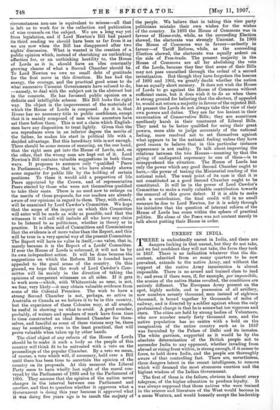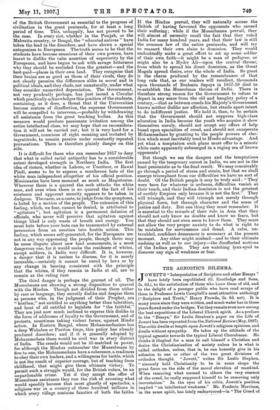UNREST IN INDIA.
THERE is undoubtedly unrest in India, and there are dangers lurking in that unrest, but they do not take, and we feel confident they will not take, the form they took in 1857. There is no indicatiOn whatever that the dis- content, admitted from so many quarters to be now prevalent, extends to the native Army, and without the support of the native Army insurrection is almost impossible. There is no armed and trained class to lead it ; and even if there were, if, for example, Ter impossibile, the armies of the native States revolted, the conditions are entirely different. The European Army present on the spot, highly mobile, and in possession of all artillery, now numbers seventy thousand men instead of eighteen thousand, is bound together by thousands of miles of railway, and is directed by a soldier against whom the only professional charge is that he is somewhat too vigorous and stern. The cities are held by strong bodies of Volunteers, who now number nearly forty thousand men, and the native population has no centre with a hold on the imagination of the entire country such as in 1857 was furnished by the Palace of Delhi and its inmates. The white garrison, supported as it would be by the absolute determination of the British people not to surrender India to any opponent, whether invading from abroad or rising froni within, is strong enough, if incomes to force, to hold down India, and the people are thoroughly aware of that controlling fact. There are, nevertheless, three dangers latent in the recent intelligence, to remove which will- demand the most strenuous exertion and the highest wisdom of the Indian Government.
The first of these is the failure, obvious in almost every telegram, of the higher education to produce loyalty. It was always supposed that those natives who were trained in the science 'and literature of the West would become in a sense Western, and would honestly accept the leadership
of the British Government as essential to the progress of civilisation in the great peninsula, for at least a long period of time. This, unhappily, has not proved to be the case. In every riot, whether in the Punjab, or the Mahratta country, or Bengal, the " educated natives " have taken the lead in the disorders, and have shown a special antagonism to Europeans. The truth seems to be that the students have become conscious of their own powers, have learnt to dislike the calm assertion of superiority by the Europeans, and have begun to ask with savage bitterness why they should be excluded from the greatest—and the best-paid—places in their own land. They recognise that their brains are as good as those of their rivals, they do not clearly perceive the difference alike in moral and in political ideals, and they chafe, not unnaturally, under what they consider ,unmerited depreciation. The Government, not very prudently perhaps, has just issued a Circular which practically acknowledges this position of the students, containing, as it does, a threat that if the Universities become centres of disaffection, the supreme Government will be compelled to intervene,—probably by withdrawing all assistance from the great teaching bodies. As this measure would produce passionate irritation among the entire intellectual class, we may hope that on reconsidera- tion it will not be carried out ; but it is very hard for a Government, conscious of right meaning and irritated by ingratitude, to remain passive under constantly repeated provocations. There is therefore plainly danger on this side.
It is difficult for those who can remember 1857 to deny that what is called racial antipathy has to a considerable extent developed strength in Northern India. The first idea of rioters, whether in Lahore, or Umritsur, or Rama Pindi, seems to be to express a murderous hate of the white man independent altogether of his official position. Missionaries have been menaced as much as Magistrates. Wherever there is a quarrel the mob attacks the white man, and even when there is no quarrel the fact of his existence and apparent security appears to be taken in dudgeon. The caste, as a caste, to judge from the symptoms, is hated by a section of the people. The extension of this feeling, which, we fear, cannot be denied, is attributed to " agitators " ; but agitation is a permanent delusion of officials, who never will perceive that agitation against things liked is only waste of breath and energy. You must hate before your hate can be transmuted by external persuasion from an emotion into hostile action. This feeling, which seems self-generated, for the Europeans are not in any way oppressing the people, though there may be some dispute about new land assessments, is a most dangerous one, for it would make the residence of whites, except soldiers, in India very difficult. It is, however, a danger that it is useless to discuss, for it is nearly incurable,—certainly it cannot be cured by laws or by any change in bearing consistent with the principle that the whites, if they remain in India at all, are to remain as the ruling race.
The third danger is perhaps the gravest of all. The Mussulmans are showing a strong disposition to quarrel with the Hindus. Though not divided from them either by race or language, they secretly dislike and despise them as persons who, in the judgment of their Prophet, are "heathen," not entitled to anything better than toleration, and least of all entitled to legislate for "the faithful." They are just now much inclined to express this dislike in the form of addresses of loyalty to the Governuient, and of protests, sometimes taking violent forms, against Hindu action. In Eastern Bengal, where Mohammedanism has a deep Wahabee or Puritan tinge, this policy has already produced disorders; and if it is generally adopted by Mohammedans there would be civil war in every district of India. Tho creeds would not be ill-matched in power, for although the Hindus outnumber the Mussulmans by five to one, the Mohammedans have a coherence, a readiness to obey their own leaders, and a willingness for battle, which is not the result of superior courage, but of teaching from childhood, that might give them ultimate victory. To permit such a struggle would, for the British rulers, be an unpardonable crime. Yet if they accept the offer of Mussulman assistance they run the risk of arousing what would speedily become that most ghastly of spectacles, a religious war in a country of three hundred millions in which every village contains fanatics of both the faiths.
If the Hindus prevail, they will naturally accuse the British of having favoured the opponents who caused their suffering; while, if the Mussulmaus prevail, they will almost of necessity recall the fact that they ruled India for many hundred years, and that their law is still the common law of the entire peninsula, and will try to reassert their own claim to dominion. They would undoubtedly make a great effort to set up some soldier of their own faith—it might be a man of pedigree, or might also be a Hyder Ali—upon the central throne; from which to spread his direct dominion, as the Great Moguls spread theirs, over the whole of India. So great is the charm produced by the remembrance of that long rule that, as our readers will recollect, thousands upon thousands of Brahmin Sepoys in 1857-59 died to re-establish the Mussulman throne of Delhi. There is therefore strong reason for the Government to refuse to depart in any sense from the old and haughty policy of a century,—that as between creeds his Majesty's Government knows neither dislike nor affection, but stands apart intent to do indifferent justice. We hold it; then, to be certain that the Government should not suppress high-class education in India because the youth who acquire it show themselves unruly, should not accept any offers of help based upon specialties of creed, and should not exasperate. Mohammedans by granting to the people powers of elec- tion which must inevitably tend to Hindu advantage. And yet what a temptation such plans must offer to a minute white caste apparently submerged in a raging sea of brown opponents !
But though we see the dangers and the temptations caused by the temporary unrest in India, we are not in the least pessimistic as to the final result. We may conceivably, go through a period of stress and strain, but that we shall emerge triumphant from our difficulties we have no.sort of doubt. Of the British people it may be truly said : " They were born for whatever is arduous, difficulties vanish at their touch, and their Indian dominion is not the greatest of earthly Empires only because it is not the first." They will triumph, and they will triumph not merely through physical force, but through character and the sense of Justice and duty. But one thing they must remember. It is essential to the miracle of their rule in Asia that they should not only know no doubts and know no fears, but that they should not even seem to know them. They must not allow the very proper anxiety to do what is right to be mistaken for nervousness and dread. A calm, un- troubled, confident demeanour is necessary at the present moment. Any other might mislead—and to their ultimate undoing as well as to our injury—the disaffected sections of the Indian people. They are watching lynx-eyed to discover any sign of weakness or fear.











































 Previous page
Previous page